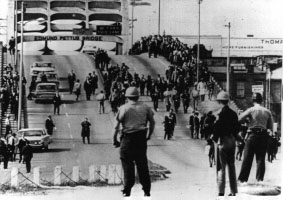Reading for April 21, fourth Sunday of Easter
The Lord is my shepherd.
I lack nothing.
2 He lets me rest in grassy meadows;
he leads me to restful waters;
3 he keeps me alive.
He guides me in proper paths
for the sake of his good name.
4 Even when I walk through the darkest valley,
I fear no danger because you are with me.
Your rod and your staff—
they protect me.
5 You set a table for me
right in front of my enemies.
You bathe my head in oil;
my cup is so full it spills over!
6 Yes, goodness and faithful love
will pursue me all the days of my life,
and I will live in the Lord’s house
as long as I live.

Reflection
The Good Shepherd leads us on paths of righteousness, and that path leads right into the valley of the shadow of death. This is the truth of Psalm 23 that is seldom stated. The path of righteousness is the path of right relationship. The Hebrew word tsedek occurs in the Hebrew Bible 118 times, and many times it is translated “justice.” The Palmist reminds us that the paths of righteousness lead into the darkest valleys.
Once, the path of righteousness crossed the Edmund Pettus Bridge. On March 7, 1965, civil rights leaders marched from Selma to Montgomery to protest unfair voting practices, about 600 unarmed marchers were met with violence from state troopers and their racist posse. Known as “Bloody Sunday,” many were beaten with batons and sprayed with tear gas.
Once, the path of righteousness ran down Christopher Street in Greenwich Village, New York. When, on June 26, 1969, the queer community of Greenwich Village had enough of the harassment, threats, and violence. They resisted the torment from NYPD and in the ensuing Stonewall uprising lasted two nights.
Jesus’ path of righteousness went from Gethsemane to Calvary. His path didn’t just go into the shadow, it plunged deep into the heart of the darkness. Yet on the other side of the Cross was a glorious Resurrection that proved the path of righteousness was the right one. The Way that leads to glory, life abundant, and life eternal goes right through the valley of the shadow of death. Christ’s rod and staff comfort us. We know we can walk this path of righteousness because Jesus prepares a table for us.
In a few days, the path of righteousness will lead down College Street to the Charlotte Convention Center. Paths of righteousness often lead into the darkest valleys. When we advocate for the oppressed, when we stand up for what is right and moral, when we have the courage to affect change, the shadow may get dark. The spiritual forces of evil rise out of the shadows with misinformation, meddling, threats, and self-righteous pandering. It is a fearful and anxious time for many of us as we walk these final steps toward General Conference.
On March 15, 1959, eight days after Bloody Sunday, President Johnson sent the Voting Rights Act to Congress. On Sunday, March 21, two weeks after 600 protestors were brutalized for daring to challenge the idol of Jim Crow, the people marched again. This time over 8,000 people began their march from Brown Chapel AME in Selma. On March 25, 25,000 reached the capitol steps in Montgomery.
One year after the uprising, on June 28, 1970, there was a parade down Christopher Street. Two years later, there were similar marches in Chicago, LA, Minneapolis, Boston, Dallas, London, Paris, West Berlin, Stockholm, San Francisco, Atlanta, Buffalo, Detroit, Washington DC, Miami, and Philadelphia. Originally known as Christopher Street Liberation Day marches, they became known as Gay Pride events to reflect that LGBTQ people no longer had to remain hidden in shadows of shame and fear but could celebrate who God created them to be.
I do not know what will come after May 3, 2024. I do not know what kind of church the UMC will be. I’m anxious because death may cast a shadow that is longer than I thought. Regardless of the outcome, I know that there will be pain and anguish from people who will feel abandoned or betrayed. I worry about the harm that may be done to people I love who hunger and thirst for righteousness, but I fear no evil. I know what comes on the other side of the valley of the shadow of death. There is table of grace already prepared for us. There is a cup of goodness that is overflowing with love. And justice, goodness, and mercy will continue to pursue us all the days of our lives.







